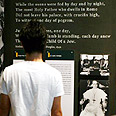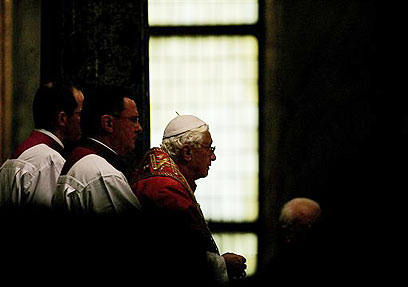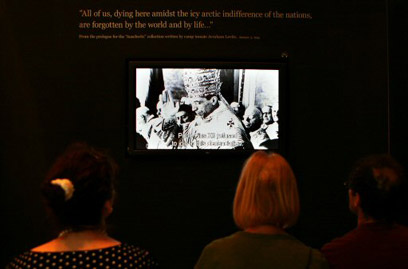
Dr. Yitzhak Minerbi, an expert on Vatican relations, told Ynet that Israel helped speed up the process of turning the World War II pope into a saint, due to lack of a suitable foreign policy and its failure to honor agreements signed with the leadership of the global Catholic Church.
Jesuit Father Peter Gumpel, the Vatican's chief judge investigating Pius' sainthood cause, declared that Pope Benedict XVI will not visit Israel despite being invited to the Jewish state until the inscription is removed. In an official statement, the Vatican renounced Gumpel's declaration.

The diplomatic relations between Israel and Vatican have always been overshadowed by the issue of Pius XII's status and the Vatican's stance during World War II. After relations were established, a committee including three Catholic and three Jewish historians was appointed to try and bridge the difference between the two sides' versions.
But shortly after it was established, the committee's work was halted due to the Catholic Church's refusal to grant the historians access to its archive, excluding 11 volumes of diplomatic writings, which are insufficient to shed light on the 49 questions phrased at the onset of the committee's work.
'Israel shouldn’t move a meter'
Dr. Minerbi was one of the historians who rejected the offer to serve as a member of the committee, due to the refusal to let the panel review the archive.
As for the inscription which supposedly ignited the disagreement once again, Minerbi believes that "Israel should not move one meter from its stance," and that it is obvious that "Pius XII was a controversial pope. However, Israel, due to its lack of a foreign policy, missed an opportunity to block the process of turning him into a saint."

About a year ago, the Vatican decided to bring Pius XII to the position of sainthood. Last Holocaust Day, the Vatican's representative in Israel, Monsignor Antonio Franco, announced he would boycott the state's Holocaust Remembrance ceremony because of the Yad Vashem inscription. Franco eventually rescinded the boycott threat after the news sent shock waves through domestic and international media.
"In one of his last addresses, Benedict XVI said he hopes the process will be successful, and when he says that, it means the process was most probably successful," says Minerbi.
The reignited dispute, Minerbi claims, is related to occurrences bellow the surface in the relations between the two countries. The missed Israeli opportunity, he says, stems from two issues: A commitment to regularize the Church's status in Israel, and relieving it from having to pay taxes.
"Israel failed to meet its commitments to cement both issues in legislation," says the researcher.
"Now Pius XII is being taken out as a pig from a poke following the barren attempts to convince Israel to fulfill the commitments it took upon itself. We have gone too far for the Church pull back from the sainthood issue. Had we shown good will at the cost of a few pennies, we may have managed to hinder this process."
'Don't hurt Holocaust survivors'
Aharon Lopez, who served as Israel's Ambassador to the Vatican between the years 1997 and 2000, believes that a solution to this dispute will not be found until the Vatican grants access to its archive and resolves questions regarding Pius XII's tenure during the Holocaust.
"At the time I said that despite the fact that the decision on this issue belongs exclusively to the Vatican, this is a controversial figure and therefore we must be sensitive towards the Holocaust survivors and allow historians to do their work properly.
"The problem is that the Vatican has gotten cold feet and prevented access to the archives," he says.
Lopez claims that Cardinal Gumpel and other Vatican officials, who support making Pius XII a saint, rely on statements made by Israeli leaders upon the wartime pope's death in 1958, that "the pope's voice was raised for the sake of the victims."
"When I was ambassador," he says, "I claimed that everything said by the Israeli leadership was said before the Eichmann trial, which exposed the horrors to the Holocaust to the entire world."
According to the former ambassador, both Israel and the Vatican must be highly sensitive when dealing with this crisis.
"Despite the Church's desire to advance the issue, they must exhibit extreme sensitivity in order to refrain from hurting the Holocaust survivors. This is the duty of us all, including the Vatican. With all due respect, one must act modestly and respectfully before hurting the survivors' feelings."















